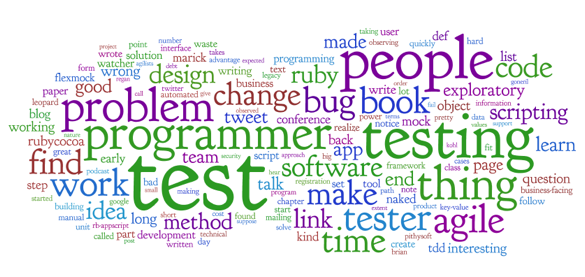My interests this year
According to Wordle’s processing of this blog’s text from the last six months, here’s what I care about:

I haven’t done the same for last year. If I did, I’m guessing I’d notice the following differences:
-
A lot less mention of Fit this year. That’s due to my decision to tone down my emphasis on automated business-facing tests in favor of exploring other ideas.
-
Still a lot of emphasis on tests and testing, but less emphasis on testers than last year, and more of an emphasis on programmers. I’m getting a lot more involved in questions of programming and design—playing to my weaknesses, as it were.
-
I’m spewing less verbiage about examples this year. Perhaps I’ve made my point.
-
Much less about Agile. I’m still not so happy about how it’s being domesticated and exploited, but it’s harder to get excited about it now that I’m no longer in a position to do much about it (not being on the Agile Alliance board any more).
A little navel-gazing is fun every once in a while. If you use Wordle, be aware that it thinks “example” and “examples” are different words. It also thinks “Example” and “example” are different words.




